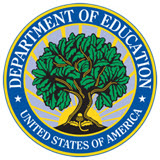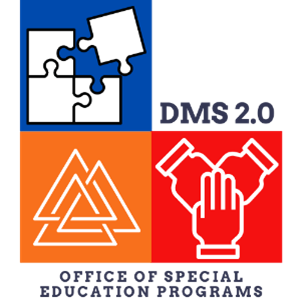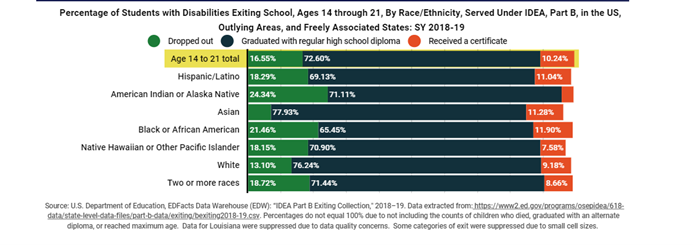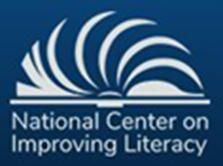In This Issue:
From the Director

Message from OSEP Director,
Ms. Valerie C. Williams
Dear Stakeholders!
As we commemorate Black History Month, there is much to celebrate. It is amazing to live in a moment in time where we’ve witnessed an African-American President, Vice-President, a cabinet where half the members are non-White and 25% are African-American and potentially an African-American woman who sits on the Supreme Court. These are thrilling times.
Despite these major historical moments and accomplishments, we know that more needs to be done. This month’s Dose of Data shows the disparities in the exit data for children with disabilities. Note that students of color have significantly higher dropout rates. The data needs to be closely examined nationally, within States and in local educational agencies, and meaningful conversations and specific actions need to occur to address this gap and other achievement gaps within our IDEA 616, 618 and 642 data collections. “Blaming away” the data and attributing the problems to high poverty or racially diverse communities will not improve dropout rates and the Savage Inequalities that Jonathan Kozol wrote about in 1988 will continue to fester across this country.
Whether it is the dropout rate, the reading achievement gap, or access to robust early intervention services for typically underserved populations, I hope you will take some time this month to think about how best to leverage the Federal funds that you work with to best support children with disabilities. As an example, when OSEP analyzed budgeted IDEA Section 611 State-level uses of funds in 2017, States were only reserving 3% of their funds for personnel shortages. Based on conversations with you, news articles and personal experiences, I would expect this percentage to increase and that the funds are targeted towards LEAs that have the hardest time attracting, preparing, and retaining special educators. I place particular emphasis on retention, given that, according to the Learning Policy Institute, 9 out of 10 vacancies are due to attrition, not retirement. Not only must we hire, but ensure personnel are prepared and well trained for the mission and the moment.
President Biden and Secretary Cardona are committed to addressing equity, justice and opportunity in concrete and meaningful ways. If you have a minute, please review the President’s Executive Orders as they impact the work of the Department broadly and OSEP specifically in improving outcomes for children with disabilities. I’m looking forward to having ongoing conversations with you about equity and how we can best support America’s children.
Lastly, please save the dates, July 19–21, 2022; OSEP will host its Leadership and Project Directors’ Conference virtually. The conference will combine OSEP’s bi-annual Leadership and Project Directors’ conferences. Additional information, including a call for proposals, agendas and registration will be posted at the OSEP Meetings web page.
In solidarity,
Valerie
|
ED Updates

Keeping the Promise
The U.S. Department of Education has launched a Keeping the Promise website to serve as a repository of resources for individuals, schools, and communities supporting Afghan newcomers and their educational goals. As part of Operation Allies Welcome, we recognize that there is an immediate and urgent need for providing high-quality, culturally responsive education to our Afghan guests — inclusive of primary, secondary, postsecondary, and adult education and English language learning.
This website contains educational materials, student and family engagement resources, fact sheets to ensure civil rights to education, policy documents, and general cultural and linguistic facts to help guide teachers, State Education Agencies (SEAs), Local Education Agencies (LEAs), Institutions of Higher Education (IHEs), and other community-based education providers. Educators have a unique chance to make a major impact on the Afghan students and families’ lives, and we hope that these resources will support you in welcoming our allies into your school community.
New submissions are welcome at KeepingthePromise@ed.gov.
Our Afghan allies and their families protected our troops, supported our diplomatic community, and served our country, we will now serve them with equitable, excellent education as we welcome them to our country.
|
 |
Office of Elementary and Secondary Education
Request for Information: Tell IES About Your Science and Math Interventions
To identify and encourage the use of evidence-based practices in education, IES is planning two new prize competitions: one to incentivize innovation in middle school science instruction and another to leverage technology to improve mathematics achievement for elementary students with disabilities using digital instruction, specifically around fractions. With these prizes, we hope to spur new thinking about how to improve student performance and encourage the participation of developers and program providers who are willing to systematically test the effectiveness of their interventions.
IES is seeking information from developers on relevant science and math interventions, including any research describing their efficacy. To share your intervention, respond to our Request for Information by February 14, 2022. For additional information, go to IES’s STEM Learning Challenges web page.
Role of Community Engagement Specialists
The U.S. Department of Education, Office of Elementary and Secondary Education, Office of Safe and Supportive Schools and its Readiness and Emergency Management for Schools (REMS) Technical Assistance (TA) Center will host a Webinar on Thursday, January 27, 2022, from 1:00 p.m. to 2:00 p.m. ET.
This Webinar will highlight the role of school-based Community Engagement Specialists in supporting school safety efforts at the local and state level. This will involve demonstrating the importance of developing a collaborative planning team to support emergency operations plan development, as outlined in Step 1 of the six-step planning process detailed in the Guide for Developing High-Quality School Emergency Operations Plans. You’ll hear from presenters including Vanessa Johns Wedderburn, a Community Engagement Specialist from the Sonoma County Office of Education as well as Janelle Hughes, a Project Director from the REMS TA Center
If you have any questions, call the REMS TA Center Help Desk at 1-855-781-REMS (7367) or email info@remstacenter.org from 9:00 a.m. to 5:00 p.m. ET, Monday through Friday. To register, click here.
Dose of Data

A New Home for IDEA Section 618 Data
The IDEA 618 data products have a new home on ED’s Open Data Platform. The older data files, static tables, and collection documentation have been migrated and are available on the Open Data platform. As of February 15, 2022, the IDEA Section 618 data will no longer be available on the current site.
|
Announcements
Technical Assistance (TA) Calls
Next TA Calls
February 10, 2022 at 4:00–5:00pm (EDT) — Grant Applications
Please join us for the February OSEP National TA Call on Thursday, February 10, 2022, at 4:00pm (EDT), where we will review important requirements for the completion of the FFY 2022 IDEA Part B and Part C grant applications. The new Grant Award packages are posted on IDEA website's Resources for Grantees page. In addition, we will share information gathered from review of States’ Part C Section III/ARP documents. These documents specify how Part C programs planned to use their ARP funds. We will provide guidance on these expenditures; revisit the FAQs on costs requiring prior approval; and describe ways in which to document information on Section III of the Part C grant application.
February 24, 2022 at 4:00–5:00pm (EDT) — DMS
OSEP will hold a second National TA Call on DMS 2.0 on Thursday, February 24, 2022, at 4:00pm (EDT). As part of the Universal TA OSEP is providing for DMS 2.0, we intend to host monthly DMS National TA calls to provide guidance on specific puzzle pieces in coordination with our Phase I monitoring activities, or other guidance related to DMS 2.0.
General Overview:
- The goal of DMS 2.0 is to improve outcomes and results for infants, toddlers, children and youth with disabilities and their families in conjunction with compliance.
- Our monitoring will focus on States’ systems of general supervision integrating both results and compliance.
- These activities are organized around the 8 puzzle pieces of general supervision:
OSEP is using various protocols in our Phase I monitoring activities, but we also encourage all States to use them as resources and self-assessments as appropriate. DMS 2.0 monthly TA calls will cover content, best practices and guidance for State’s on the completion of the various protocols, expectations and address any questions.
Previous TA Calls
January 27, 2022 at 4:00–5:00pm (EDT) — DMS
(All National TA calls are recorded and typically posted within a week)

Differentiated Monitoring and Support (DMS)
OSEP’s next Technical Assistance (TA) Call on DMS is scheduled for February 24, 2022, and will review the Dispute Resolution Protocol, providing a walkthrough of the overarching questions and previous findings made related to Dispute Resolution.. Please check the OSEP Monthly TA Call page to register for the monthly calls, review previously recorded calls and information, and access the TA Call schedule.
To review other resources and documents related to our monitoring activities (e.g., DMS 2.0, DMS Reports, and older monitoring reports), please refer to the DMS section on our IDEA website.
|
IDEA Part B/C Grants
OSEP will present on the 2022 Grant Application process during the February 10, 2022, OSEP National TA Call. Please see below for registration details.
State Performance Plans / Annual Performance Reports (APRs)
Thank you for your timely submissions of the FFY 2020 SPP/APRs on February 1, 2022. We have received all SPP/APR submissions and are in the process of reviewing them in preparation for the clarification period in April.
This Month’s Recommended Resource
2021 Annual Report to Congress on the IDEA Published
OSEP is excited to announce the release of the 43rd Annual Report to Congress on the Implementation of the Individuals with Disabilities Education Act, 2021. The report focuses on children with disabilities being served under IDEA, Part B and Part C, nationally and at the state level. It provides an overview of IDEA Section 618 and 616 data.
What Does the Data Tell Us?
Percentage of Students with Disabilities Exiting School, Ages 14 through 21, by Race/Ethnicity, Served Under IDEA, Part B, in the US, Outlying Areas,
and Freely Associated States: SY 2018–19

Consider:
- Look at the first row. This row demonstrates the percent of all students with disabilities exiting school by dropping out, graduating with regular high school diploma, or receiving a certificate.
- Now look at the other rows. These rows present students with disabilities exiting school by race/ ethnicity.
- Compare the first all students with disabilities row to the different racial/ ethnic rows.
- What differences do you find? What is the magnitude of those differences?
For more information on racial/ ethnic breakdowns, please see the OSEP Fast Facts: Race and Ethnicity of Children with Disabilities Served under IDEA Part B.
For additional thought provoking data questions and conversation starters, please see the accompanying Hand in Hand supplemental tool.
Featured Resources
 |

Shining a (Glaring) Light on Educational Inequities in Reading
Join the National Center on Improving Literacy (NCIL) on February 23, 2022, 2:00 PM (Eastern Time), for an examination of reading achievement gaps and the policy and practical solutions that can help address these gaps. This session will bring together a group of education stakeholders with a shared interest and expertise in improving literacy outcomes for students who are historically disadvantaged. Panelists will present data illustrating some of the most glaring problems with educational inequity in reading and will discuss approaches for building educational equity through policy, partnerships, and practice. Participants will receive access to a variety of free, evidence-based tools and resources. Register here.
|
|

